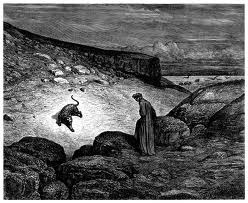Pope Boniface VIII was strongly disliked by Dante for his attempts to bring Florence within the sphere of influence of the papacy. Dante provoked the enmity of Pope Boniface VIII and his powerful allied in Florence and he was at first sentenced to death and later condemned to perpetual exile. The exile marked forever his life. However, the vicissitudes of exile inspired him to pick up his pen and write the Divine Comedy, at first titled Comedìa. The adjective Divine was due to Giovanni Boccaccio, a great follower of Dante. Dante suffered an equally indigent and illustrious exile, in the latter case thanks to the benevolence of some Great Lords of his time. He died in Ravenna in 1321.
Dante’s Comedy [ Cantos I-XI]
A Brief description of Hell.
Dante and Virgil encountered with historical and mythological figures, interpreted as a symbol of a particular capital crime . Dante lost the right way in a forest (symbol for sin), but he met with Virgil, the great Roman poet, thanks to whom the Florentine poet will show the punishments of Hell (Canto I). Dante doubted he would be able to succeed. However, he took courage because was comforted by Virgil, and Dante followed him as a master (Canto II). The two poets came to the gate of Hell, and they read the terrible words that are written on it. Then they entered Hell, in the place where sluggards (who were indifferent both to evil and good) were punished. Dante and Virgil arrived at the Acheron river, where they found Charon, who took the souls over to the opposite shore. Dante and Virgil descended into Limbo, the first circle of Hell, where they found those who have lived honestly, but were not baptized and not suffered for corporal punishments. In the second circle of Hell, Dante and Virgil look at Minos, the Judge of Hell. Minos admonished them to be cautious how they entered this circle. Here they found the carnal sinners, and among them they met with Francesca of Rimini. Later Dante fainted (Cantos III, IV, V).
When Dante woke, the two poets were in the third circle, in which the gluttonous were punished under an incessant and dense storm . Dante and Virgil met with Cerberus and Dante spoke with Ciacco, a well-known Florentine gluttonous man, and then they entered the fourth circle, where the skinflints and the spendthrifts were punished (Canto VI). The two poets went down to the fifth circle, where they found the Stygian lake where the irascible men were tormented . The two poets compassed round the lake, and finally found a massive tower (Canto VII). Dante and Virgil were conveyed on the other side by Phlegyas, the ferryman of the lake. They met with Filippo Argenti, a raving lunatic man whose fury was described. Finally, the two poets arrived at the city of Dis, but many demons refused entrance to city (Canto VIII). However, Dante and Virgil by the help of an angel, entered the city of Dis, where the heretics were tormented in tombs burning with fire. Dante spoke with Farinata degli Uberti, who prophesied the poet’s exile from Florence (Canto IX-X). Dante and Virgil entered the seventh circle, where they found the tomb of Pope Anastasius, called the heretic, who was Pope from 496 to 498 and believed in the heresy of Euthices. Finally, they went towards the seventh circle (Canto XI).
According to G. Contini, [Dante, “Rime”, edited by Gianfranco Contini, Torino, Einaudi, 1973, p. 85], “Alighiero II, the son of Bellincione, was born around 1210, and was already dead in 1283. On Forese Donati, see the sonnets against Forese, in Contini, pp. 85-86.
